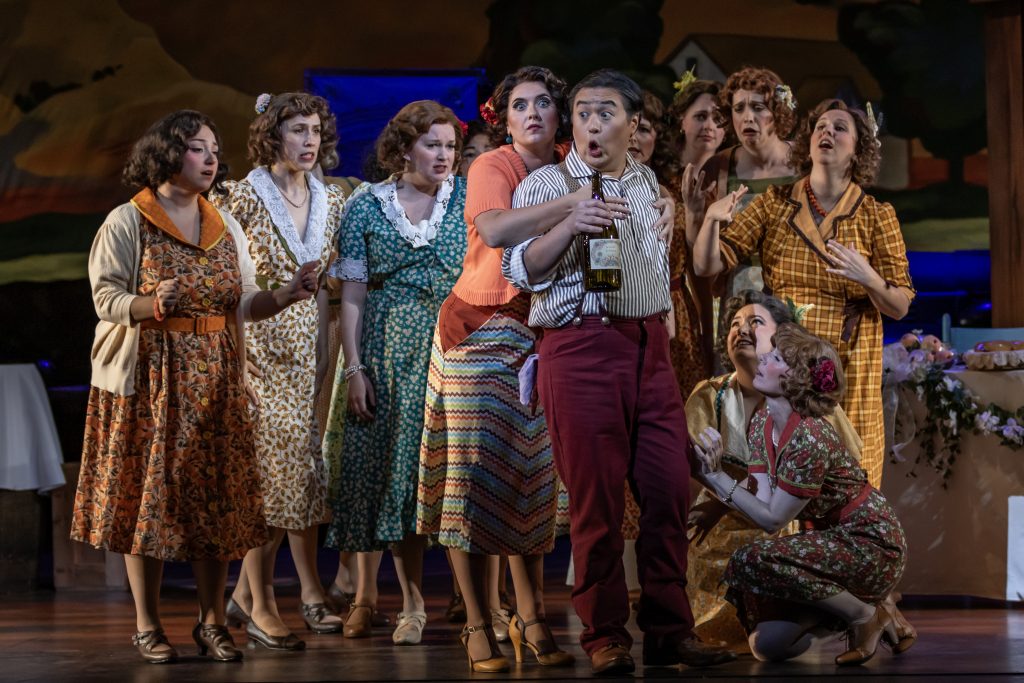Florentine’s ‘Elixir of Love’ Is Silly Fun
Great voices and moments of sincerity gave the show more heft.
18th century Italian composer Donizetti doesn’t jump into the mind as quickly as Verdi or Puccini or even France’s Bizet when you think of stalwarts of the grand opera repertoire.
Except for his Elixir of Love (L’Elisir D’Amore as the Italian supertitles remind us). Dating back nearly two centuries (to 1832) and loaded with familiar arias, this two-act opera has been done several times over the decades by the Florentine Opera Company and was staged once again this past weekend at Uihlein Hall – though I doubt previously with as sincere romanticism within the comedy as offered by its imported but unheralded leads, soprano Marie-Eve Munger and tenor Andrew Stenson.
If the entire production had followed their spirit of sincerity within the silliness, this would have been one of the most musically sympathetic and thought-provoking Florentine productions in recent memory.
There were moments. Stage director Brenna Corner provided a more impish style than common in operatic mime – even fun when done with a cane. She also brought more humanity to the large Florentine Chorus pretending to be farmhands, soldiers and families, updated to a Disney-pretty California vineyard of the 1930s. Occasionally the chorale’s adults were a little too school-marmy in telling the kids in the chorus where to go (as in crawling in and out), but when everyone relaxed that group-think there was more nifty humanity and interaction from the chorus than has been the tradition.
Similarly, conductor Domenico Boyagian wasn’t trying to show off the pit power of the Milwaukee Symphony Orchestra, which is certainly there, but diligently coaxed the violins and particularly the woodwinds into a thoughtful low-key blend with the singers.
At best, Elixir’s hold on the audience lies in how silliness marries ardor – and may surprise operagoers in how rustic buffoonery can combine with poetic romantic meaning. Not all the singers are right there with the concept – this may be a problem with how leading operatic voices carry famous roles from company to company, preventing the full touch of originality some involved in this production may have wanted. The Florentine relies on this traveling school of opera newcomers and stars – it is really key to how regional opera works. Exceptional tenor Stenson certainly polished his Nemorino with noted outings at Seattle Opera.
The veterans who have done the roles elsewhere sure have the chops. Darren Drone had a showy imposing baritone and flamboyant manner as the mammoth strutting romantic sergeant, but he knows all too well how to play to the front rows. Similarly comic basso Zachary Nelson had a clear voice and proper oily manner as the wine salesman deceiving the peasants. But his rhythm-minded recitative mannerisms undercut some subtler comic possibilities.
The production bounced a bit between some old-fashioned ways of interpreting 18th century repertoire and some more sophisticated improvements by the romantic leads.
The plot turns Nemorino, our lovesick but honest rustic tenor, into a country buffoon believing only a magic potion – cheap wine — will win the hand of the aloof, rich, bookish soprano Adina. There are well-traveled arias and clashing duets, even a famous comic barcarole. Indeed, some of the arias such as una furtiva lagrima were staples for Caruso and Pavoratti, but Stenson is in his own fine company, and used such arias to back up acting like an oaf with modulated believability. Munger did the same in her famous sequences, reminding us that the startling power of the human voice only emerges from softer perfect control.
Some Florentine patrons more used to the storm and drama associated with grand opera theatrics seemed a bit put back during the opening night performance. Unlike operas of old, the production didn’t stop for applause. You had to know when to erupt. But the most genuine and memorable moments deserved whatever eruptions the half-full house delivered.
Dominique Paul Noth served for decades as film and drama critic, later senior editor for features at the Milwaukee Journal. You’ll find his blogs here and here.
If you think stories like this are important, become a member of Urban Milwaukee and help support real, independent journalism. Plus you get some cool added benefits.





















